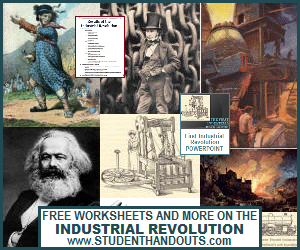 |
Industrial Revolution Educational Materials |
|---|
www.studenthandouts.com > World History > Industrial Revolution |
|
The Industrial Revolution was a profoundly important period in world history for several key reasons. It marked a significant shift in the way societies organized their economies and produced goods, with far-reaching consequences for global development. Here are some of the primary reasons why the Industrial Revolution is considered crucial to world history. Transformation of Production: The Industrial Revolution marked a shift from agrarian and craft-based economies to industrial and mechanized production. It introduced new technologies and methods of manufacturing, increasing productivity and output. Urbanization: Industrialization led to the rapid growth of cities as people moved from rural areas to urban centers in search of employment. This urbanization transformed the social and demographic landscape, shaping modern cities. Technological Advancements: The era saw the invention and widespread adoption of significant technologies, such as the steam engine, cotton gin, and power loom. These innovations revolutionized industries and transportation, making them more efficient. Economic Growth: Industrialization contributed to significant economic growth, with increased production leading to higher incomes and improved living standards for many. It laid the foundation for modern capitalism and market-driven economies. Global Trade and Imperialism: The Industrial Revolution played a role in fueling global trade and imperialism. Industrialized nations sought raw materials and markets for their manufactured goods, leading to colonial expansion and global economic interconnectedness. Social Changes: Industrialization brought about profound social changes, including shifts in social classes, labor conditions, and family structures. The rise of the industrial working class and the labor movement were significant outcomes. Political Effects: The Industrial Revolution had political repercussions, including demands for workers' rights, the emergence of socialist and labor movements, and changes in political ideologies. It contributed to the spread of democracy and political reform. Environmental Impact: The shift to industrial production had environmental consequences, including increased pollution, deforestation, and resource depletion. It marked the beginning of environmental concerns and debates about sustainability. Education and Innovation: As societies industrialized, there was an increased emphasis on education and innovation. This laid the groundwork for advances in science, technology, and medicine in the following centuries. Global Influence: The Industrial Revolution set the stage for the rise of Western powers as industrial and colonial giants, significantly influencing global politics, economics, and culture. Mass Media and Communication: Innovations in printing and communication technologies, such as the telegraph and later the telephone, transformed the dissemination of information, news, and ideas, contributing to the spread of knowledge and culture. Art and Culture: The changes brought about by the Industrial Revolution influenced art, literature, and culture. Artists and writers explored themes related to industrialization, urban life, and the human experience in this new world. The Industrial Revolution was a pivotal period in world history that reshaped economies, societies, and cultures. Its impact reverberates to this day, influencing the way we live, work, and interact with the world. The Industrial Revolution accelerated progress in numerous fields and set the stage for modern industrial societies and the globalization of economies. This unit of free educational materials focuses on the Industrial Revolution in global history, from its origins in the Commercial Revolution, Scientific Revolution, and Intellectual Revolution, through advances in English cotton manufacturing, to its spread to continental Europe, the United States, and beyond. Particular attention is paid to inventors from the period, such as Arkwright, Hargreaves, Kay, Stephenson, Diesel, et al. The term "Industrial Revolution" was first popularized in the early 1880s by economic historian Arnold Toynbee (British, 1852-1883). |
www.studenthandouts.com > World History > Industrial Revolution |







